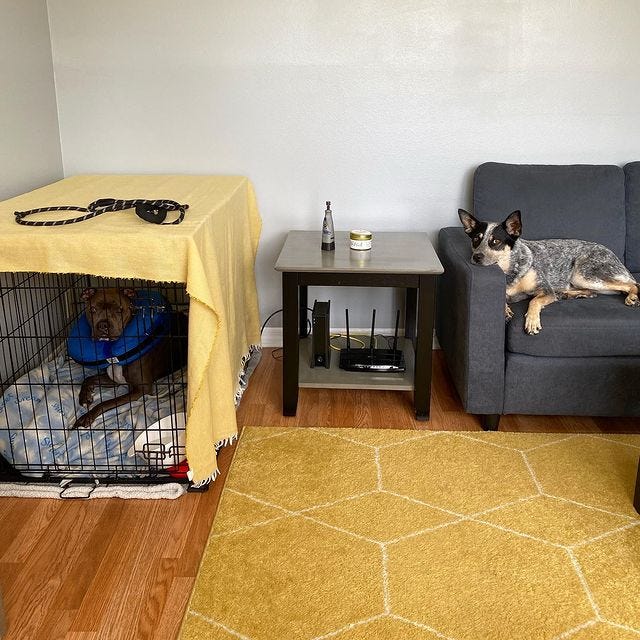What I’d tell myself before fostering a dog
Sean and I were lucky to be able to foster five dogs in 2022. Each experience changed me, teaching lessons about dog training, responsible ownership, prioritization, my own shortcomings, the importance of a strong support network… and so much more. I think our fosters will always feel larger than life in my mind and in my heart. (Especially in my heart.)
Here are the things I’d tell myself if I could go back in time before we ever opened up our home.
TLDR summary
The below Instagram post was the foundation for this longer blog, visually summing up some journaling I’d done about fostering when we took in a sick puppy named Joey.
Start with the two most important questions
Can you keep each animal in your care safe?
Can you meet everybody’s needs (including your own)?
As long as those answers are yes, it’s okay if everything isn’t “perfect”—like if your resident dog doesn’t love being a foster sibling, or you don’t have the capacity to do every cool thing you see fellow foster families do online, or the secondhand crate you were able to find on a budget isn’t exactly the right size for your new puppy addition…
There can be a lot of pressure in the dog world. The rescue community is no exception. But what really matters, above all else, is that you can provide a safe space for an animal in need while also being fair to your household’s long-term residents.
That balance will look different for everyone. There are no hard-and-fast rules black-and-white answers. Focus on the big questions. Center yourself around them. And let the rest come from there.
Fair isn’t always equal
I remember being told “fair isn’t always equal” growing up. After caring for multiple dogs with different needs and preferences and personalities, I don’t think I’ve ever understood what my parents meant more.
Sean called it early on that the hardest thing about fostering for me would be balancing my energy between both creatures. I am over-the-moon obsessed with Scout—and it was also so important to me that any animal coming into our home felt safe and welcome and loved. How could I give everyone what they needed (and not drown in guilt)?
Turns out: By reminding myself that being fair to all dogs does not require me to treat them in exactly equal ways!
In short: Panicking about whether each animal in your care is getting the “same” attention isn’t productive. What is productive? Asking what matters most to each dog. What will have the greatest impact on your shared life? What will most benefit their future?
Prioritize what you can (you can’t do it all)
We want to provide the best environment possible for every dog we foster… while also remembering it’s a temporary arrangement. Not everything has to be straight out of a “dog owner of the year” catalog!
I’ve found it helpful to make a list of daily non-negotiables for each dog in our care and use that as my baseline. Some days you’ll go above and beyond—but as long as those top priorities are covered, you can rest easy. Something is better than nothing!
Examples of our daily non-negotiables for each dog in our care
Food (we try to adjust calories based on activity level and weight goals)
Access to fresh water (available 24/7 except with potty training puppies)
Some type of physical activity or enrichment as medical conditions allow (play is the best option, followed by sniffing, engaged social time, and so on)
Adequate deep sleep (which requires a comfortable, safe space to rest and enough fulfillment to be able to relax)
There will be struggles (and that’s okay)
Stress, chaos, confusion, self-doubt, bathroom accidents, barking, whining… these things are inevitable (at least to a degree). Difficult moments will happen. And they will suck. It’s okay to accept that they’re hard and feel what you feel.
You don’t have to love every single minute of fostering for it to be worthwhile!
Take a deep breath, forgive yourself, and forgive your dogs. You can learn so much from each mishap to be even better equipped moving forward. A recurring theme of these lessons: Don’t try to chase perfection. Don’t fixate on being the greatest foster family the world has ever seen. Just focus on doing right by your dogs.
Take care of yourself, too
And do right by yourself.
Be proactive about your own needs the same way you are about your animals’. Make time for your physical, mental, and emotional health. Think about your own layered stress model. Treat your wellbeing as a real priority during your foster experience—even if this means the dogs get extra crate time while you sneak in a nap or go for a run or call your mom or have dinner with your partner or do some journaling or whatever you need.
Without your ability to function (perhaps not at your best but at least most of the way there) everything else will crumble. You can’t pour from an empty cup!
Letting go is hard… but worth it
Saying goodbye to a foster is emotional — but it’s also incredibly rewarding. When one animal passes through your home, you get the chance to decompress with your resident pets, reflect on your experience, and (if you want to) do it all over again.
Life keeps moving forward, but you will never forget your fosters. Each day you’ll thank them for all they taught you and daydream about how they’re doing now. It will hurt, it will elate, you’ll both laugh and cry, and you will never really let go. Not all the way. Relish in that.
Related reflections on fostering
Our initial foster dog integration process and changes over time
How we decided to foster with our fear reactive resident dog







